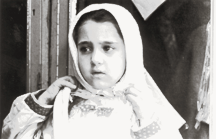
Childhood Dreamer: Aïda Mohammadkhani can't live without a new goldfish in Jafar Panahi's "The White Balloon."
A young Iranian girl sets her mischievous heart on a prize fish in 'The White Balloon'
By Richard von Busack
The most noble quality of cinema is that it eliminates the notion of an alien country by observing average lives in visual terms easy to read and understand. Americans used to the idea of Iran as Satan's rumpus room will see a different sort of landscape in The White Balloon. This small but beautiful tale concerns Razieh (Aïda Mohammadkhani), a 7-year-old Tehran girl determined to get her hands on a goldfish for the New Year celebration (a pre-Islamic Persian custom calls for the display of goldfish on the New Year). The price of the fish is 100 tomans, about 50 cents American, a noticeable sum for her family. Razieh finds that wheedling the sum out of her beleaguered mother (Fereshteh Sadr Orfani) is only the first step in landing her fish; her actions are recorded in real time during the last hour and a half before the New Year's Eve celebration.
As played, or perhaps embodied, by Mohammadkhani, Razieh is an intrepid little girl who is still trusting and slow enough to be cheated out of her money, still babyish enough to deliberately turn on her tears if she thinks it will work. It's a bold, mischievous characterization that's perhaps slightly dangerous, coming as it does from a country where censorship is an art. Director Jafar Panahi's unease with a nation that's been in arms for decades is seen in Razieh's difficult conversation with a soldier (Mohammad Shahani). If we're paying attention, we can learn that currency reform programs and devalued money have left Iran suspicious about paper money. As the heroine of the story, Razieh is testing the limits of what women are allowed to do in a place like Iran. Having nearly lost her 500 tomans note by being ripped off watching snake charmers, Razieh explains why she went to them even though her mother told her that women didn't go there: "I wanted to watch what wasn't good for me." So do I, although in the occasional slow moments, I had the sensation that what I was watching was meant to be good for me.
The White Balloon conveys that deep, even timeless, childhood feeling of being thwarted at something you really want, of how something like a bowl of goldfish can be a life-or-death matter. The film is also a marvelously done slice of childhood life on a stormy afternoon before a holiday weekend--a mood as recognizable in Tehran as it would be in Terre Haute. But even at 85 minutes, the film lengthens from quiet moments to a trance, stretching out the story past its natural length. The White Balloon connects you intimately with the nature of a child's world, maybe so much that part of you becomes--not often, but occasionally--the impatient child that tugs on a parent's sleeve.
The White Balloon (Unrated; 85 min.), directed by Jafar Panahi, written by Abbas Kiarostami, photographed by Farzad Jowdat and starring Aïda Mohammadkhani.
[ Metro | Metroactive Central ]
